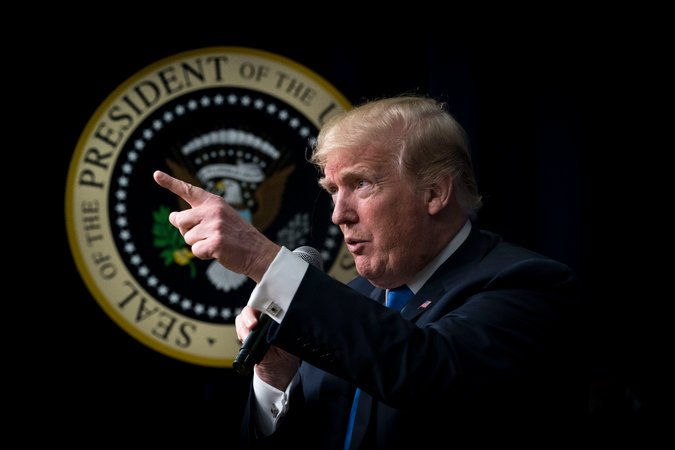Beg, Borrow or Steal: How Trump Says China Takes Technology
Arranged marriages. Whispered warnings. Outright theft.
For years, American companies have complained that the Chinese government finds ways to get them to hand over their most valuable trade secrets. Those companies — which usually complain anonymously, fearing Chinese retribution — have found a sympathetic ear in the Trump administration.
American trade officials on Thursday cited those practices as a major motivation for their plans to levy tariffs and penalties on $60 billion in Chinese imports and to take a tougher stance on the vast and lucrative trade relationship between the two countries. The report outlines in blunt terms how intellectual property — everything from product designs and sensitive data to general know-how — has become a point of contention in global trade relations, joining longstanding areas of dispute like steel.
The landscape is more complex than the Trump administration’s complaint suggests. American companies sometimes willingly strike deals with Chinese partners because they feel China is too profitable to miss out on. And in some cases, Chinese companies have shown they still have much to learn, even after cozying up to American partners.
Arranged Marriages
In some industries, like car production, China has long required foreign companies to team up with local partners. Auto giants like General Motors and Ford, for example, make cars in Chinese factories that are jointly owned by Chinese partners.
Advertisement
Continue reading the main story
Foreign companies have long complained that they are simply training future rivals. Japanese and European businesses say Chinese rail companies used technology from joint ventures to become giants in high-speed rail.
Continue reading the main story
Trade rules limit how much technology the Chinese partner can get from a joint venture. But some American businesses and the Trump administration say Chinese officials often demand technology under the table.
The joint venture requirements have spread to other fields. China is pressuring foreign companies to share knowledge with local partners if they want to make electric cars in China — an industry in which China has plans to become a major player. Companies like Qualcomm, Hewlett Packard Enterprise and Microsoft have also struck up Chinese partnerships in recent years to avoid political pressure or regulatory tangles.
Having a foreign partner is no sure indicator that a Chinese company is ready to take on the world. While Chinese factories have churned out higher-quality cars, including some destined to be exported to the United States, no Chinese automaker has developed a homegrown brand appealing enough to sell overseas in major numbers.
License to Share
The Trump administration also said Thursday that Chinese officials used bureaucratic licensing and approvals to gain control over sensitive data.
Take cloud computing. New Chinese rules require companies running cloud-computing operations to be locally controlled. To comply, Apple and Amazon have handed stewardship of their Chinese data to local companies.
Companies like Apple and Amazon have set up ventures with local partners to handle data in China — a requirement that Chinese officials say is driven by security and privacy concerns. Chinese officials have also pressured foreign companies to give them access to sensitive technology as part of a review process to make sure those products are safe for Chinese consumers.
The foreign companies involved, like Apple, argue that the sensitive data remains safeguarded. Technology companies say the reviews they submit to are not thorough enough to expose their deepest secrets. Chinese officials say many foreign companies voluntarily hand over technology.
Shopping Spree
If the technology won’t come to China, China will go out and buy it.
Thursday’s report accuses the Chinese government of directing private Chinese companies to buy American know-how through corporate deals. Those purchases include some cutting-edge areas, like semiconductors, aviation, robotics and self-driving cars. A Department of Defense report last year also argued that Chinese investors were financially backing innovative start-ups.
Advertisement
Continue reading the main story
The Trump administration isn’t the first to worry. After Chinese buyers snapped up some American semiconductor companies three years ago, the Obama administration began rejecting other deals on national security grounds.
In many cases, the Chinese buyers have argued that they have no ties to the government and invest in technology for the same reasons that everybody else does. One start-up executive told The New York Times last year that his company took Chinese financial backing simply because American officials and companies didn’t.
Five-Finger Discount
Some American companies say their Chinese rivals get secrets the old-fashioned way.
American companies and their Washington backers contend that Chinese companies have stolen secrets to help build up businesses in areas like wind turbines, often through hacking. The complaint is a longstanding one. Under the Obama administration, the government indicted in absentia five Chinese military officers for engaging in commercial espionage.
The Chinese government angrily denied the accusations. In recent years, some experts say, Chinese hacking has ebbed.
A version of this article appears in print on March 23, 2018, on Page A10 of the New York edition with the headline: How President Says Technology Is Taken. Order Reprints| Today's Paper|Subscribe
Continue reading the main storyRead the Original Article






























